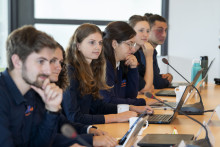Last week, all Dutch citizens of eighteen years and above, including students and people within academia, had the opportunity to vote in municipal elections. Like every year, there was a voting booth on the UT campus, and as usual, it was expected for left-wing parties to end up in the lead. And there were no big surprises: GroenLinks and D66 came out as the victors on campus.
We asked Janko Chavannes, a third year Technical Computer Science student, and Frank Reekers, a Mechanical Engineering master student, what they thought about this voting behavior.
What do you think of these results?
Reekers: ‘I guess that is to be expected from students. Generally speaking they are more leaning towards the left wing and more inclined to care about environmental policies.’
Chavannes: ‘That is also what you can see in national voting polls, since young people tend to vote more for such parties than more traditional parties like the VVD.’
What could be the reason for this apparent voting behavior?
Chavannes: ‘For example the VVD is more of a party for people who earn above average, so that might be less appealing for students since they are not in a position (yet) where they earn a lot of money. Also, students receive education nowadays to think in a sustainable manner.’
Reekers: ‘A party such as D66 says they are the education party of the Netherlands and one of their core ideas is to shove more money towards education. So that could also be one reason why students pick such a party.’
How do you experience the left-wing atmosphere yourself?
Reekers: ‘I don’t think you really experience a left-wing atmosphere, the only thing you really experience sometimes is that people make fun of right-wing parties. At a university, no student will publicly announce that they vote for a party like the PVV.’
Chavannes: ‘In my study people don’t really speak about who they vote for. It is simply a non-issue. Like, if you vote now, it doesn’t really have an influence on what you experience as a student. When you are a fulltime employee, the needs and wants are different from when you are a student so a lot of people will likely be more politically engaged as they grow older.’
But shouldn’t academia be politically neutral?
Reekers: ‘I think if you do research in an area where your political view does not influence your work at all, such as quantum mechanics, it doesn’t really matter a lot if you are neutral or not.’
Chavannes: ‘That is true, you’re mostly not here at a university to shape your political view. So in a sense it is no different from when you are at local sport association and someone spouts some political nonsense.’
What would be the ideal political situation at a university?
Reekers: ‘Neutral or maybe even non existent in a technical study. Politics has no place in certain subjects. At universities it should always be about the quality of an argument and the way people substantiate their view, regardless of their political ideology.’
Chavannes: ‘Neutral. Even though for some subjects such as ethics I can imagine that what politicians do has an influence on the stuff that we view as acceptable or ethical.’








